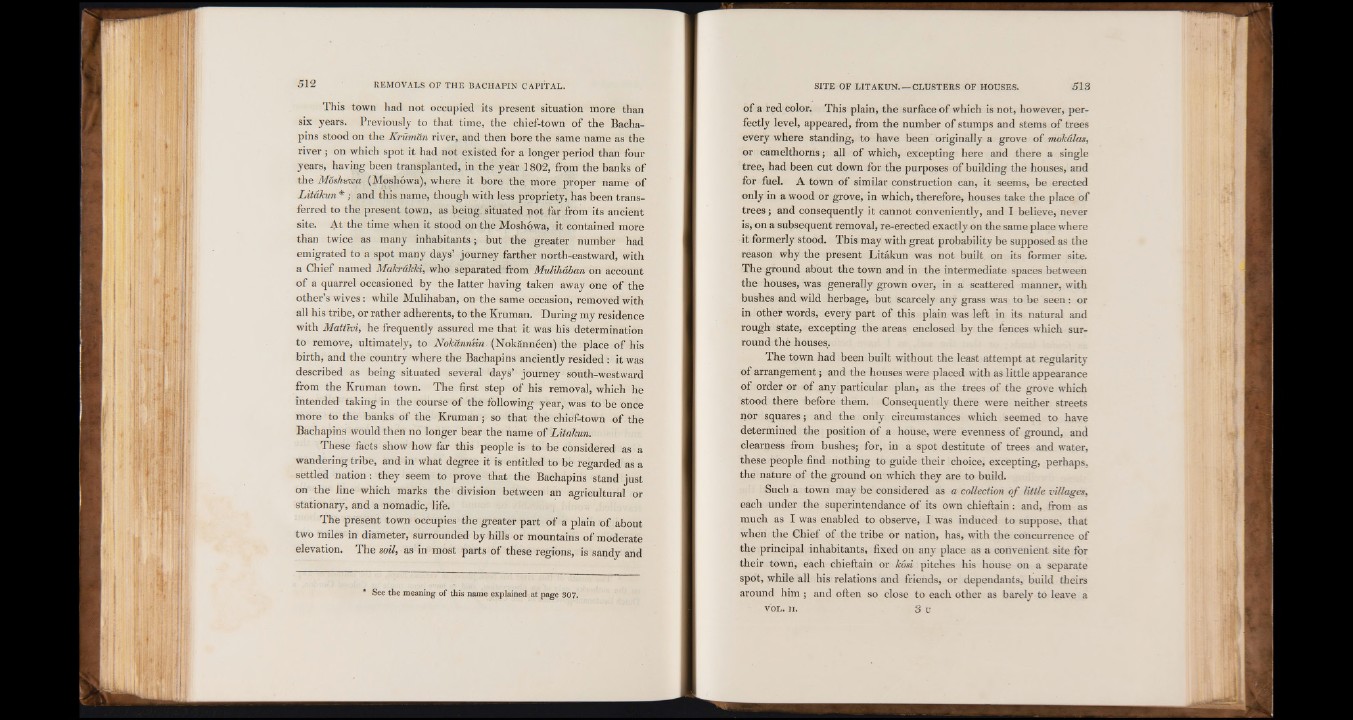
This town had not occupied its present situation more than
six years. Previously to that time, the chief-town of the Bacha-
pins stood on the Krumtm river, and then bore the same name as the
river; on which spot it had not existed for a longer period than four
years, having been transplanted, in the year 1802, from the banks of
the Mdshxwa (Moshowa), where it bore the more proper name of
Litakun * ; and this name, though with less propriety, has been transferred
to the present town, as being, situated not far from its ancient
site. At the time when it stood on the Moshowa, it contained more
than twice as many inhabitants; but the greater number had
emigrated to a spot many days’ journey farther north-eastward, with
a Chief named Makrakki, who separated from Mulihaban on account
of a quarrel occasioned by the latter having taken away one of the
other’s wives: while Mulihaban, on the same occasion, removed with
all his tribe, or rather adherents, to the Kruman. During my residence
with Maffivi, he frequently assured me that it was his determination
to remove, ultimately, to Nokdnmin (Nokanneen) the place of his
birth, and the country where the Bachapins anciently resided : it was
described as being situated several days’ journey south-westward
from the Kruman town. The first step of his removal, which he
intended taking in the course of the following year, was to be once
more to the banks of the Kruman; so that the chief-town of the
Bachapins would then no longer bear the name of Litakun.
These facts show how far this people is to be considered as a
wandering tribe, and in what degree it is entitled to be regarded as a
settled nation: they seem to prove that the Bachapins stand just
on the line which marks the division between an agricultural or
stationary, and a nomadic, life.
The present town occupies the greater part of a plain of about
two miles in diameter, surrounded by hills or mountains of moderate
elevation. The soil, as in most parts of these regions, is sandy and
* See the meaning of this name explained at page 307.
of a red color. This plain, the surface of which is not, however, perfectly
level, appeared, from the number of stumps and stems of trees
every where standing, to have been originally a grove of mokalas,
or camelthorns; all of which, excepting here and there a single
tree, had been cut down for the purposes of building the houses, and
for fuel. A town of similar construction can, it seems, be erected
only in a wood or grove, in which, therefore, houses take the place of
trees; and consequently it cannot conveniently, and I believe, never
is, on a subsequent removal, re-erected exactly on the same place where
it formerly stood. This may with great probability be supposed as the
reason why the present Litakun was not built on its former site.
The ground about the town and in the intermediate spaces between
the houses, was generally grown over, in a scattered manner, with
bushes and wild herbage, but scarcely any grass was to be seen: or
in other words, every part of this plain was left in its natural and
rough state, excepting the areas enclosed by the fences which surround
the houses.
The town had been built without the least attempt at regularity
of arrangement; and the houses were placed with as little appearance
of order or of any particular plan, as the trees of the grove which
stood there before them. Consequently there were neither streets
nor squares; and the only circumstances which seemed to have
determined the position of a house, were evenness of ground, and
clearness from bushes; for, in a spot destitute of trees and water,
these people find nothing to guide their choice, excepting, perhaps,
the nature of the ground on which they are to build.
Such a town may be considered as a collection of little villages,
each under the superintendance of its own chieftain: and, ftom as
much as I was enabled to observe, I was induced to suppose, that
when the Chief of the tribe or nation, has, with the concurrence of
the principal inhabitants, fixed on any place as a convenient site for
their town, each chieftain or kosi pitches his house on a separate
spot, while all his relations and friends, or dependants, build theirs
around him ; and often so close to each other as barely to leave a
v o l . h . 3 u